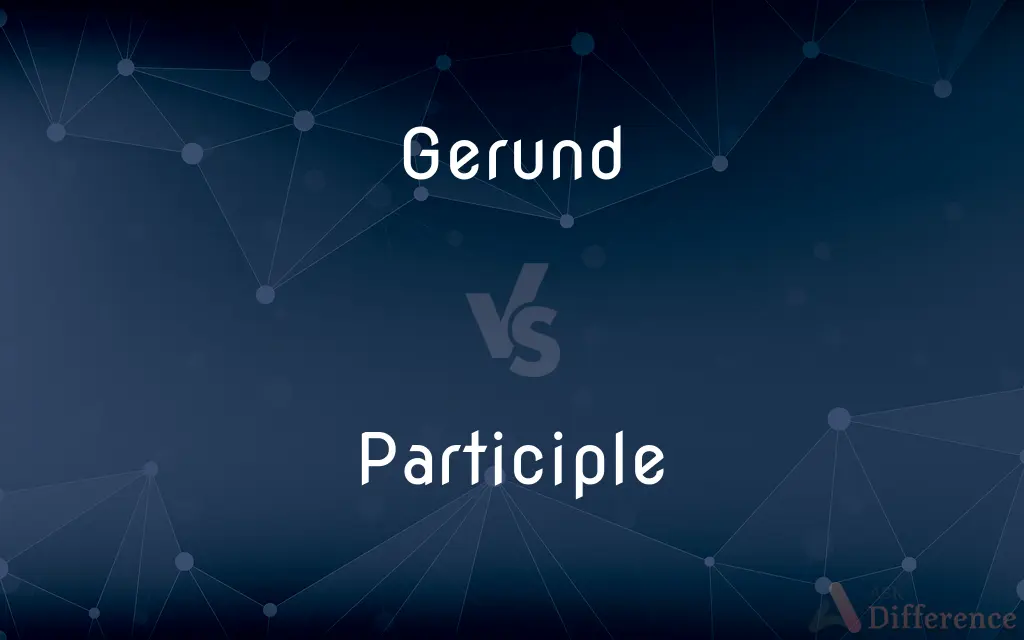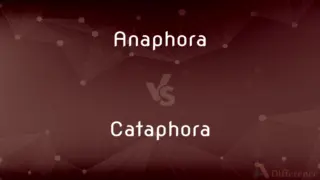Gerund vs. Participle — What's the Difference?
Edited by Tayyaba Rehman — By Fiza Rafique — Updated on October 13, 2023
A Gerund is a verb form acting as a noun, ending in -ing (e.g., reading). A Participle also involves verb forms but is used as an adjective or to form verb tenses.

Difference Between Gerund and Participle
Table of Contents
ADVERTISEMENT
Key Differences
Gerunds function as nouns in sentences, thereby assuming roles like subject, object, or complement. In contrast, Participles serve to describe nouns or pronouns, often conveying actions or states related to them.
Whereas Gerunds consistently employ the -ing form of verbs (like swimming, talking), Participles can appear in present (-ing: eating) or past (-ed for regular, varied for irregular verbs: eaten) forms.
Gerunds imply general activities, unlinked to specific timelines. However, Participles might insinuate time-related aspects due to their potential to reference ongoing (present participle) or completed (past participle) actions.
A notable application of Gerunds involves their capability to express activities in a general context (like “Fishing is fun”). Meanwhile, Participles often engage in forming complex verb tenses (like “He is fishing”).
Gerunds don’t usually interact with other nouns directly in terms of modification. Contrastively, Participles actively modify nouns or pronouns, contributing descriptive nuances (like “a broken vase”).
ADVERTISEMENT
Comparison Chart
Function in Sentence
Acts as a noun
Acts as an adjective or forms verb tenses
Form
Always ends in -ing
Present (-ing) or past (-ed or irregular)
Time Connotation
No specific time connotation
Can imply ongoing or completed actions
Example Sentence
Swimming is fun
The swimming athlete (Present Participle)
Interaction with Nouns
Doesn’t directly modify nouns
Directly modifies nouns or pronouns
Compare with Definitions
Gerund
Gerunds act as nouns.
Reading relaxes the mind.
Participle
Participles form verb tenses.
She has moved abroad.
Gerund
A Gerund is a verb’s -ing form.
Running is exhilarating.
Participle
Past Participles end in -ed or are irregular.
The sunken ship was found.
Gerund
Gerunds represent general actions.
Traveling can be educational.
Participle
A Participle modifies nouns.
The shattered window was expensive.
Gerund
Gerunds don’t indicate specific times.
Writing requires patience.
Participle
Participles can be active or passive.
Bored, she left the party.
Gerund
Gerunds can be subject or object.
Cooking can be creative.
Participle
Present Participles end in -ing.
A rising sun brings hope.
Gerund
A gerund ( abbreviated GER) is any of various nonfinite verb forms in various languages; most often, but not exclusively, one that functions as a noun. In English, it has the properties of both verb and noun, such as being modifiable by an adverb and being able to take a direct object.
Participle
In linguistics, a participle (PTCP) is a nonfinite verb form that has some of the characteristics and functions of both verbs and adjectives. More narrowly, participle has been defined as "a word derived from a verb and used as an adjective, as in a laughing face".“Participle” is a traditional grammatical term from Greek and Latin that is widely used for corresponding verb forms in European languages and analagous forms in Sanskrit and Arabic grammar.
Gerund
In Latin, a noun derived from a verb and having all case forms except the nominative.
Participle
A form of a verb that in some languages, such as English, can function independently as an adjective, as the past participle baked in We had some baked beans, and is used with an auxiliary verb to indicate tense, aspect, or voice, as the past participle baked in the passive sentence The beans were baked too long.
Gerund
In other languages, a verbal noun analogous to the Latin gerund, such as the English form ending in -ing when used as a noun, as in singing in We admired the choir's singing. See Usage Note at fused participle.
Participle
(grammar) A form of a verb that may function as an adjective or noun. English has two types of participles: the present participle and the past participle. In other languages, there are others, such as future, perfect, and future perfect participles.
Gerund
(grammar) A verbal form that functions as a verbal noun. (In English, a gerund has the same spelling as a present participle, but functions differently; however, this distinction may be ambiguous or unclear and so is no longer made in some modern texts such as A Comprehensive Grammar of the English Language and The Cambridge Grammar of the English Language)
Participle
A part of speech partaking of the nature of both verb and adjective; a form of a verb, or verbal adjective, modifying a noun, but taking the adjuncts of the verb from which it is derived. In the sentences: a letter is written; being asleep he did not hear; exhausted by toil he will sleep soundly, - written, being, and exhaustedare participles.
By a participle, [I understand] a verb in an adjectival aspect.
Gerund
(grammar) In some languages such as Dutch, Italian or Russian, a verbal form similar to a present participle, but functioning as an adverb to form adverbial phrases or continuous tense. These constructions have various names besides gerund, depending on the language, such as conjunctive participles, active participles, adverbial participles, transgressives, etc.
Participle
Anything that partakes of the nature of different things.
The participles or confines between plants and living creatures.
Gerund
A kind of verbal noun, having only the four oblique cases of the singular number, and governing cases like a participle.
Participle
A non-finite form of the verb; in English it is used adjectivally and to form compound tenses
Gerund
A verbal noun ending in -e, preceded by to and usually denoting purpose or end; - called also the dative infinitive; as, "Ic hæbbe mete tô etanne" (I have meat to eat.) In Modern English the name has been applied to verbal or participal nouns in -ing denoting a transitive action; e. g., by throwing a stone.
Gerund
A noun formed from a verb (such as the `-ing' form of an English verb when used as a noun)
Common Curiosities
Can Participles end in -ed?
Yes, if they are past participles of regular verbs.
Does a Gerund always end in -ing?
Yes, always.
Can Gerunds and Participles appear similar?
Yes, but they function differently.
Can a Gerund be a subject?
Yes, e.g., "Running is fun."
Is a Participle involved in tense formation?
Yes, e.g., present perfect tense.
Does a Participle describe nouns?
Yes, it modifies nouns or pronouns.
Can Gerunds and Participles be in the same sentence?
Yes, each serving its function.
Is a Gerund a verb?
No, it’s a verb form used as a noun.
Can Participles be used in passive voice?
Yes, e.g., "The movie was loved by many."
Can a Participle act as a noun?
No, it acts as an adjective or forms verbs.
Can a sentence start with a Gerund?
Yes, e.g., "Jogging is healthy."
Can a Gerund follow a preposition?
Yes, e.g., "She is good at singing."
Can Gerunds indicate time?
No, they have no specific time connotation.
Is the Participle “burned” present or past?
Past.
Is "watching" in "Watching TV, she dozed off." a Gerund?
No, it’s a Participle.
Share Your Discovery

Previous Comparison
Anaphora vs. Cataphora
Next Comparison
Testatrix vs. TestatorAuthor Spotlight
Written by
Fiza RafiqueFiza Rafique is a skilled content writer at AskDifference.com, where she meticulously refines and enhances written pieces. Drawing from her vast editorial expertise, Fiza ensures clarity, accuracy, and precision in every article. Passionate about language, she continually seeks to elevate the quality of content for readers worldwide.
Edited by
Tayyaba RehmanTayyaba Rehman is a distinguished writer, currently serving as a primary contributor to askdifference.com. As a researcher in semantics and etymology, Tayyaba's passion for the complexity of languages and their distinctions has found a perfect home on the platform. Tayyaba delves into the intricacies of language, distinguishing between commonly confused words and phrases, thereby providing clarity for readers worldwide.













































